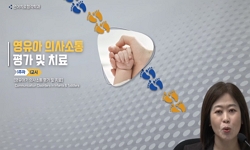Objectives: The caregiver-child relationship is key to the physical and mental health of children. Prevention and early intervention programs that support caregivers are a growing public health initiative. In the present study, we developed a caregive...
http://chineseinput.net/에서 pinyin(병음)방식으로 중국어를 변환할 수 있습니다.
변환된 중국어를 복사하여 사용하시면 됩니다.
- 中文 을 입력하시려면 zhongwen을 입력하시고 space를누르시면됩니다.
- 北京 을 입력하시려면 beijing을 입력하시고 space를 누르시면 됩니다.

12∼24개월 걸음마기 대상 양육자-자녀관계검진 프로그램 개발 연구: 가족센터 적용을 중심으로 = The Caregiver-Child Relationship Checkup Program for Toddlers 12-24 Months of Age: An Application to the Family Center
한글로보기https://www.riss.kr/link?id=A108462582
- 저자
- 발행기관
- 학술지명
- 권호사항
-
발행연도
2023
-
작성언어
Korean
- 주제어
-
등재정보
KCI등재
-
자료형태
학술저널
- 발행기관 URL
-
수록면
121-153(33쪽)
- 제공처
-
0
상세조회 -
0
다운로드
부가정보
다국어 초록 (Multilingual Abstract)
Objectives: The caregiver-child relationship is key to the physical and mental health of children. Prevention and early intervention programs that support caregivers are a growing public health initiative. In the present study, we developed a caregiver-child relationship checkup(CRC) program and investigated its effectiveness in one of the nationwide community-based family centers. Method: A single-case, multiple-baseline design was used. Participants were 4 families with toddlers and 7∼8 data points were collected during the baseline phase and the intervention phase. After 2 months following the feedback phase, a follow-up interview was conducted and visual and statistical analyses were performed to evaluate the effectiveness of the CRC. Results: Overall, findings suggested that the CRC positively influenced caregivers, especially in heightening their self-understanding and understanding of how to improve relationships with their children. Participants also reported high levels of satisfaction with the CRC. Conclusions: These results support that the CRC can be a promising, brief prevention/intervention program for assessing and supporting caregiver-child relationships in the community-based family centers.
동일학술지(권/호) 다른 논문
-
신(新)중년 배우자관계 만족도와 삶의 만족도가 은퇴 전후과정에서 우울에 미치는 영향: 베이지안잠재성장모형(B-LGM)을 중심으로
- 한국가족관계학회
- 박선미
- 2023
- KCI등재
-
인지행동커플치료 기반의 비대면 화상상담과 디지털치료도구의 효과성 검증
- 한국가족관계학회
- 김진아
- 2023
- KCI등재
-
아동이 지각하는 부모애착이 아동의 관계적 공격성에 미치는 영향: 또래존재감과 거부민감성의 이중매개효과를 중심으로
- 한국가족관계학회
- 김동민
- 2023
- KCI등재
-
결혼이주여성의 양육스트레스와 문화적응스트레스, 양육효능감과 유아기질의 영향: 중국, 베트남, 일본 여성 비교 중심으로
- 한국가족관계학회
- 프리만, 트로이 크리스찬
- 2023
- KCI등재




 KISS
KISS




